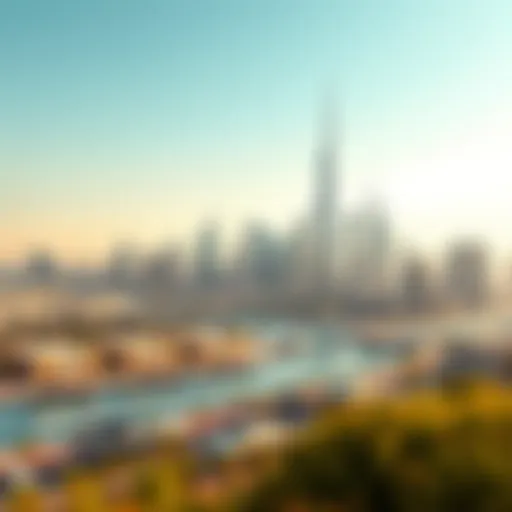Iftar Traditions in Dubai During Ramadan
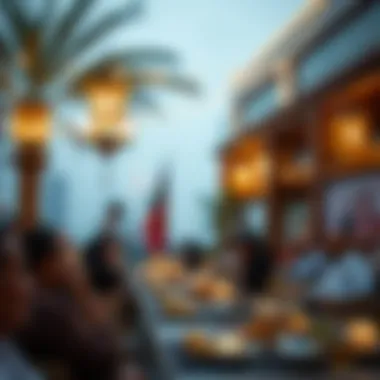

Intro
Ramadan is more than just a month of fasting for Muslims; it is a time of reflection, community, and rich traditions. In Dubai, a city known for its dynamic architecture and diverse populace, Iftar—the meal that breaks the fast—is celebrated with great fervor. This social event transforms streets, hotels, and homes into vibrant communal spaces, where people gather to share not just food, but also time, stories, and fellowship. The city's various cultures blend together, creating unique Iftar customs that reflect a tapestry of traditions.
From lavish banquet halls to family gatherings, there are numerous venues that host these evening meals, accommodating both locals and expatriates alike. Moreover, the culinary delights offered during Iftar go beyond traditional Arabic fare. Influenced by Dubai's multicultural setting, one can find everything from Pakistani biryani to Indian samosas on Iftar tables, showcasing an array of flavors that appeal to all.
Beyond the culinary aspect, the communal gatherings during Iftar play a significant role in fostering a sense of belonging. It is during these evenings that Dubai’s rich culture blossoms, inviting everyone—whether they are long-term residents or visitors—to join in and partake in this unique experience. As we delve deeper into the Iftar traditions in Dubai, we will also explore how these gatherings impact the local real estate market, providing insights that could be beneficial for investors and potential homebuyers looking at this vibrant backdrop.
In the following sections, we will unravel the local market trends, property types, and various cultural experiences surrounding Iftar, illustrating not only its significance during Ramadan but also its broader implications in Dubai’s real estate landscape. Stay tuned as we navigate through this rich tradition and its resonance in one of the world's most iconic cities.
Cultural Significance of Iftar
Iftar represents more than just the act of breaking the fast; it encapsulates numerous cultural layers woven into the fabric of Dubai’s social life during Ramadan. For expatriates and locals alike, this daily ritual fosters a sense of community and belonging. Each evening, as the sun dips beneath the horizon, families and friends gather around tables overflowing with an array of foods, laughter, and stories. This gathering reinforces the bonds that sustain relationships, transcending individual experiences to forge collective which are central to the city's identity.
Historical Context of Iftar
Historically, the tradition of Iftar is rooted in the early days of Islam. The practice of fasting during Ramadan was established to deepen one's spiritual connection and to promote self-discipline. In retrospect, we see that Iftar serves as a thread linking generations, as families continue to share this sacred moment together.
In Dubai, the evolution of Iftar from a modest meal to an extravagant affair reflects the city’s transformation into a global hub. Initially, Iftar was a simple affair, often comprising dates and water, the essentials to replenish the body after a long day of fasting. Now, it stands as a sumptuous event, showcasing an incredible variety of culinary delights influenced by both traditional and modern dishes.
In many ways, it has become a canvas for chefs to display their creativity, reflecting a vibrant tapestry of cultures that contribute to Dubai’s unique character. The historical context demonstrates that while Iftar has maintained its core essence, it has also adapted and evolved.
Religious Importance during Ramadan
From a religious standpoint, the importance of Iftar during Ramadan cannot be overstated. It is believed that breaking the fast should be done at sunset, an act that is laden with spiritual significance. The phrase "Iftar" itself means to 'break the fast' in Arabic, and it is accompanied by specific traditions, such as the recitation of the "du'a" or supplication before the meal, inviting blessings for the food and the community.
In observing Iftar, Muslims not only share food but also give thanks for their fortunes. It is not uncommon for community members to prepare meals for those who are less fortunate, showcasing generosity and compassion—a central tenet of Islam. This gesture not only enriches community ties but also reminds everyone of the importance of charity during this holy period.
"Breaking bread is not merely a physical act; it symbolizes unity and fraternity among all, echoing through generations."
During Ramadan, Dubai thrives on the principles of sharing and humility. Restaurants and homes alike open their doors to serve their neighbors, creating an environment where everyone can come together, irrespective of background. This communal aspect is pivotal in cultivating understanding and respect among the diverse population that resides in the city, forging friendships that stand the test of time.
In summary, while Iftar is a moment of personal reflection and gratitude, its cultural and religious significance binds the community together, enriching the fabric of life in Dubai. It serves as a reminder of the interconnectedness of individuals, reflecting both individual and collective devotion.
Iftar in Dubai: A Culinary Journey
Iftar in Dubai transcends mere sustenance; it represents a culinary journey steeped in cultural nuances and community spirit. The act of breaking the fast, especially in a vibrant city such as Dubai, offers a sumptuous showcase of flavors that reflect the city's cosmopolitan identity, merging traditional Middle Eastern recipes with global culinary influences. Exploring this culinary realm during Ramadan provides a unique insight into the rich tapestry of traditions and the shared experience they foster among Dubai's diverse populace.
Traditional Foods for Iftar
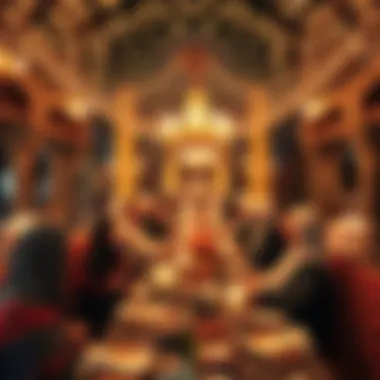

As the sun sets, families and friends gather, eager to indulge in traditional foods that hallmark the Iftar experience. Across the UAE, common dishes such as dates and water mark the breaking of the fast, embodying both sustenance and symbolism by linking to the practices of the Prophet Muhammad. The dates are often paired with Arabic coffee, symbolizing hospitality and warmth.
Beyond dates, local favorites like Samboosa (savory pastries filled with meat or vegetables), Dajaj Mashwi (grilled chicken marinated with herbs), and a pot full of fragrant Luqaimat (sweet dumplings) offer a delightful start to the evening. Additionally, hearty stews like Maqbous, which blends rice with meat and spices, reflect the communal element of dining, bringing groups together to share meals and conversation.
Modern Dining Experiences
With the changing tides of dining preferences, Dubai also caters to those seeking modern dining experiences during Iftar. Upscale restaurants and hotels roll out extravagant buffets featuring a mix of traditional and contemporary dishes. One might savor dishes like truffle-infused hummus or lobster tagine, deftly incorporating global flavors while honoring local culinary roots.
Such experiences are often enhanced by live cooking stations creating a sense of performance and engagement, elevating the usual meal into an event. Venues like Hotel Atlantis offer beautifully curated settings that transform ordinary dining into an extravagant affair where families can experience lavishness alongside cherished customs.
Influence of Global Cuisines
Dubai, being the melting pot it is, showcases an impressive influence of global cuisines during Ramadan. The globalization of food culture means that, alongside Arabic fare, visitors and residents can enjoy a plethora of choices — from Asian culinary delights like spring rolls and sushi, to Italian classics featuring rich pastas and savory pizzas.
Hotels and restaurants invite chefs from different parts of the world to contribute their specialties, which creates a diverse Iftar menu. The infusion of these international flavors illustrates how Dubai embraces multiculturalism during the holy month while also appealing to the expatriate community and tourists seeking tastes from their homelands.
"In Dubai, Iftar is more than just a meal; it's a shared moment where cultures collide and traditions thrive, giving every bite a story to tell."
By bridging the traditional with the contemporary, Iftar in Dubai becomes a culinary journey that not only nourishes the body but also reinforces bonds within families and communities. Understanding this aspect is especially valuable for potential investors and homeowners, as the culinary scene plays a substantial role in the lifestyle narrative of the city. As Iftar evolves, so does the opportunity for real estate in catering and hospitality, defining a landscape that resonates with diversity and depth.
Popular Iftar Venues in Dubai
Iftar, breaking the fast, is not just a meal; in Dubai, it represents a cultural ritual steeped in community bonding and shared experiences. As a cosmopolitan hub, the city offers a plethora of venues catering to diverse tastes, making Iftar a culinary celebration. This section explores various spots where residents and visitors come together to embrace the spirit of Ramadan.
Luxury Hotels Offering Iftar Buffets
For many, indulging in Iftar at luxury hotels is a highlight of Ramadan. These venues pull out all the stops, creating lavish buffets that showcase the best of Middle Eastern and international cuisines. Hotels such as the Burj Al Arab and the Atlantis, The Palm provide breathtaking settings where every detail, from ambiance to presentation, speaks of opulence.
Guests can expect a cornucopia of traditional dishes, from dates and Arabic coffee to more elaborate offerings like lamb ouzi and biryani. The luxury buffets allow diners not just to savor food but also to immerse themselves in the festive atmosphere. Being surrounded by beautiful decorations, soft music, and the gentle hum of conversation creates a unique experience that transcends a mere meal.
"Dining at a luxury hotel during Iftar isn’t just about food—it's about creating memories in a glorious setting."
Community Gatherings and Tent Experiences
While luxury often takes the spotlight, community gatherings at tent experiences capture the heart of Iftar traditions in Dubai. During Ramadan, many neighborhoods set up tents that offer free meals to those in need, fostering a sense of togetherness. Places like Al Seef and Dubai Festival City host such initiatives where families from all walks of life come together to break bread.
These gatherings serve as a reminder of the spirit of giving, where residents contribute food or funds to support the initiative. A warm bowl of harira soup or a plate of sambusak can be enjoyed while mingling with neighbors, making these experiences deeply enriching. The sense of camaraderie here is palpable; laughter and shared stories add warmth to the communal spread.
Cultural Centers and Local Restaurants
For those keen on a more authentic touch, cultural centers and local restaurants offer a treasure trove of Iftar options that reflect the rich tapestry of traditional Emirati cuisine. Establishments like Al Fanar Restaurant or Zahrat Lebnan prepare dishes that embody the cuisine's essence, respecting age-old recipes passed down through generations.
Participating in an Iftar at these venues allows guests to taste home-cooked meals, such as majboos and khamir bread, while immersing themselves in the cultural narrative of the UAE. The informal atmosphere encourages storytelling, furthering the bond created over breaking the fast.
In a bustling city like Dubai, these restaurants embody a slice of the local flavor, providing visitors an opportunity to engage directly with the culture.
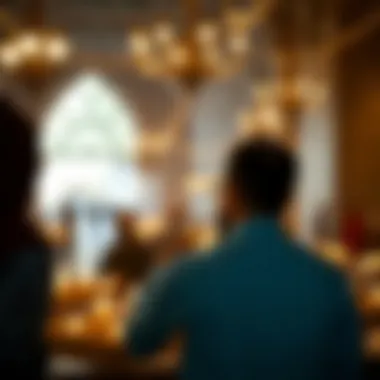

With a mix of luxury, community spirit, and authenticity, the venues that host Iftar in Dubai reflect the city’s multifaceted identity and the deep-rooted ties of tradition during Ramadan.
Iftar as a Community Event
Iftar in Dubai transcends the simple act of breaking the fast; it encapsulates the spirit of community. As the sun sets and the call to prayer echoes through the air, families, friends, and even strangers come together to share this cherished moment. This sense of unity during Ramadan holds profound significance, as it fosters relationships and strengthens bonds among individuals in a city known for its diversity.
Family Gatherings
Family is often the heart of Iftar celebrations, especially in a multicultural hub like Dubai. During Ramadan, families make it a priority to eat together, creating a warm atmosphere filled with laughter and storytelling. The blend of cultures adds a unique flavor to these gatherings. Traditional dishes such as dates, lentil soup, and biryani might share space on the table with a mix of international cuisines, recognizing the global fabric that Dubai represents.
Gatherings often happen at home or in larger venues, such as community centers, where families and friends can partake in the festivities together. The experience is more than just sharing food; it becomes a ritual that brings generations together. Children delight in the experience, often looking forward to the special delicacies their family prepares each year.
It's common for families to invite neighbors and friends to join in the feast. This practice extends beyond mere hospitality; it's a way to cultivate connections and promote a sense of belonging. In these moments, shared stories and laughter echo through the air, crafting lasting memories that transcend the individual experience of fasting and feasting.
Charitable Initiatives and Community Support
During Ramadan, the spirit of giving comes alive in Dubai. Iftar serves as a launchpad for numerous charitable initiatives aimed at helping those in need. Many local businesses and organizations step up, providing free meals and food packages to the less fortunate. This charitable aspect transforms Iftar into a community event geared towards empathy and solidarity.
Various mosques around the city open their doors for communal Iftar gatherings. These events welcome everyone, regardless of their background, allowing them to break their fast in a nurturing environment. The initiative exemplifies the value placed on community support; thus, creating a approach that encourages philanthropy while uniting people.
"The act of giving food during Ramadan does not only fulfill hunger but also nourishes the soul, reestablishing connections with the community."
Moreover, corporate entities in Dubai often launch campaigns during Ramadan to promote donations and philanthropic activities. They take this opportunity to organize food drives or fund scholarships for underprivileged children. Noteworthy organizations, such as the From the Heart Foundation or Ramadan Sharing, gain traction in raising awareness and funds for various causes.
All in all, Iftar as a community event not only honors traditions but enhances communal ties, leveraging the month of Ramadan to instigate purposeful actions that ripple throughout society.
For more information on community initiatives, you can explore resources like Wikipedia or Britannica.
The Role of Real Estate in Iftar Celebrations
As Ramadan unfolds each year in Dubai, the role of real estate takes on new dimensions, especially during Iftar. The city buzzes with the anticipation surrounding this special time, not just as a spiritual occurrence but as a noteworthy economic catalyst. Homeowners, investors, and expatriates find themselves in a unique landscape where traditions intermingle with real estate dynamics. Understanding this intersection helps not only in grasping local customs but also in navigating property trends.
Impact of Ramadan on Rental Demand
During Ramadan, the demand for rental properties sees a pronounced shift. Many expatriates and locals rush to secure spaces closer to vibrant Iftar gatherings and cultural events. This surge is often tied to the need for convenience during the fasting month. Here are some key observations:
- Increased Demand for Community-Centric Locations: Areas known for celebrated Iftar venues or community gatherings, like Jumeirah or Downtown Dubai, see an uptick in rental inquiries. People prefer to be near the heart of festivities.
- Short-Term Rentals: A noticeable rise in short-term rentals occurs, attracting visitors looking for an immersive experience during Ramadan. Homeowners convert properties into attractive holiday rentals, cashing in on the cultural appeal.
- Family-Oriented Properties: Families seek larger residences or those with communal amenities where they can host family Iftars. Properties with private gardens or terraces become increasingly sought after.
"Ramadan transforms Dubai into a melting pot of traditions, and its real estate reflects the beauty of communal sharing."
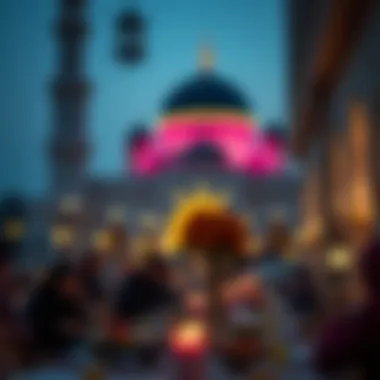

Opportunities for Property Investors
Investors looking to tap into the Ramadan spirit can find lucrative opportunities amidst the seasonal shifts. The unique traditions surrounding Iftar create several avenues for profitability:
- Developing Hospitality Ventures: Properties that offer Iftar-specific dining experiences can be highly profitable. Establishing a restaurant specializing in traditional Iftar fare or even a food tent can draw in sizable crowds.
- Community Space Development: With an emphasis on communal gatherings during Ramadan, there’s potential in investing in spaces that cater to group activities. Parks, halls, or pop-up venues serve as centers for Iftar celebrations, making them very marketable.
- Investment in Luxury Rentals: High-end properties in desirable locations become great investments for Iftar season. They attract affluent families and expatriates who wish to celebrate in style; luxury amenities become key selling points.
Safety and Regulations During Ramadan
When it comes to celebrating Iftar in Dubai during Ramadan, understanding safety and regulations is paramount. This month is not just about fasting; it is a period steeped in respect, traditions, and communal bonds. Knowledge of the guidelines that impact dining hours and practices can enhance the experience while ensuring compliance with the local customs.
Dining Regulations and Hours
In Dubai, the regulation surrounding dining during Ramadan acts like a fine thread weaving respect through the community. During daylight hours, food consumption in public is restricted; this practice is observed in respect of those fasting.
- Dining Hours: Typically, restaurants will close during the day and reopen after the Maghrib prayer, which is when Iftar begins. This reopening can vary depending on the establishment, but many restaurants are keen to welcome diners promptly as the sun sets. Some places might open a bit earlier to prepare special meals and allow patrons to gather.
- Eating Outdoors: It's essential to remember that eating or drinking in public spaces during daylight is not allowed. Observing the cultural norms is crucial for everyone, including visitors. You can enjoy your meal within the confines of private settings or designated dining venues.
- Iftar Events: Many hotels and community centers host Iftar buffets featuring a wide range of cuisines, attracting both locals and expatriates. Reservations are often recommended, as these events can be quite popular, bustling with life as people gather to break the fast together.
COVID-19 Considerations in the Current Year
In light of the ongoing global pandemic, Dubai’s approach to Ramadan Iftar also has adapted. Health and safety considerations have become part and parcel of the celebration.
- Social Distancing: While the festive atmosphere is pivotal, many venues implement social distancing measures. Tables are often arranged to promote space between diners.
- Sanitization Protocols: Guests can expect thorough sanitization procedures at dining establishments, including temperature checks upon entry and availability of hand sanitizers. The emphasis on hygiene reflects a deeper respect for health in the community.
- Limitations on Guests: Depending on the current health regulations, the number of attendees at Iftar gatherings may be capped, so planning ahead is essential to secure a spot for you and your loved ones.
While the festive spirit is alive and well, health and safety are at the forefront. As the community comes together to break bread, understanding these regulations is vital to ensure a smooth and respectful celebration.
"Respecting the cultural and health norms during Ramadan not only enriches personal experience but also enhances communal relationships."
Staying informed about the local rules not only shows respect for the customs but also ensures that all participants can enjoy the richness of the Iftar tradition safe and sound.
Epilogue: The Essence of Iftar in Dubai
The Iftar tradition in Dubai encapsulates more than just the breaking of a fast; it embodies the cultural and social fabric of this vibrant city. Iftar is a moment of unity, reflection, and generosity, allowing families, friends, and even strangers to come together and share a meal after a long day of fasting. This collective observance highlights the importance of community, a cornerstone of Dubai's identity, especially during the holy month of Ramadan.
Reflections on Contemporary Practices
In recent years, the practices surrounding Iftar have evolved while still holding on to their roots. The diverse culinary offerings available reflect Dubai's international and multicultural persona. Gone are the days when Iftar was limited to traditional dishes. Nowadays, you might find a sumptuous buffet featuring everything from classic dates and lentil soup to sushi and gourmet burgers in upscale hotels and restaurants.
Additionally, social media plays a pivotal role in shaping how people experience Iftar. Instagram feeds often overflow with captivating images of beautifully arranged tables, showcasing not just food but also the ambiance of gatherings. Enhancing the experience, many establishments hold themed events during Ramadan, enticing diners with special promotions and unique menus.
There’s a growing emphasis on sustainability and health as well. Many chefs are now incorporating organic ingredients and offering lighter meal options to cater to the wellness-conscious crowd. As a result, Iftar is not merely about indulging; it’s transforming into an opportunity for healthful eating while still honoring the tradition.
The Future of Iftar Celebrations in Dubai
Looking forward, the future of Iftar in Dubai seems promising. The city is undoubtedly moving toward further inclusivity, embracing not just traditional Islamic prisms but also accommodating more worldly tastes and preferences. With an expanding expatriate community and the influx of tourists, the options for Iftar will only broaden, catering to varying culinary palates and dietary needs.
Furthermore, the real estate sector may witness shifts as more facilities adapt to cater to Iftar gatherings. Residential complexes are likely to enhance their communal dining experiences, creating vibrant spaces for families to gather during Ramadan. This evolution can attract local and international investors looking to tap into the increasing demand for culturally enriched living spaces.
As we step into an era where globalization melds with tradition, the essence of Iftar in Dubai will not fade; rather, it will deepen, enriched by diversity and change, ensuring that the spirit of togetherness and community endures.









